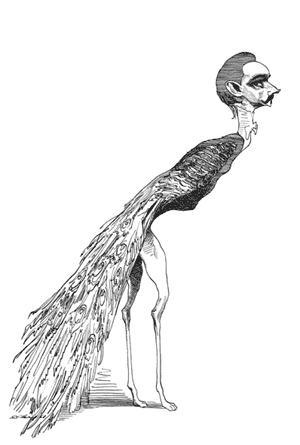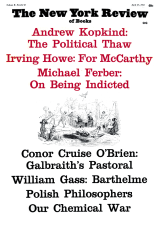Count Robert de Montesquiou was an aristocrat, poet, wit, art critic, art patron, interior decorator, male beauty queen, and arbiter of elegance. A hollow man, yes; but the more you peel off the layers, the more he is still there. If he was a fake, he was a genuine fake.
He was observed for thirty years, admiringly but implacably, by a writer of supreme genius, who created from him and a few others the most tremendous and awful personage in the twentieth-century novel, the Baron de Charlus in Remembrance of Things Past. We cannot and should not forget that Montesquiou lives, and will live forever, in the hero-villain of Marcel Proust’s search for Time, a fictitious character as comic as Falstaff and as tragic as Lear. Even a genius doesn’t make something from nothing, and Charlus is the big clue to Count Robert’s real worth, the proof that he was more than an expendable eccentric in a vanished, silly era. It wasn’t a silly era, or no sillier than ours, and it hasn’t vanished; it was where we came in, the beginning of modern times, and we are still working out in art and politics its discoveries, its possibilities, its right and wrong turnings. Touch the web anywhere, and you will find a thread leading sixty or seventy years back to Paris, and not far away, though always a bit off center, in a limelight of his own, Count Robert scurrying around and screeching. He was an eccentric, goodness knows, but not expendable. So it becomes all the more important and interesting to dismiss the Baron de Charlus for a while, and find what Count Robert de Montesquiou was like, in real life. This Quest for Montesquiou is the theme of Philippe Jullian’s remarkable biography.
“I LIKE YOU, Montesquiou,” said Anatole France, “because you’re so proud”; though France also remarked of him, with equal candor: “I can’t bear that man who’s always talking about his ancestors!” Count Robert disliked all his relatives—including his father, who replied, when blamed “for making me what I am,” “I didn’t do it on purpose!”—but he adored his ancestors. They went back thirteen centuries (so do ours, but few of us know so well just how), to the Merovingian kings of France, so that he could boast about “my grandfather Clovis,” “my uncle Childebert,” and later to the fourth musketeer D’Artagnan, to courtiers who stalk through the palace of Versailles in Saint-Simon’s Memoirs, to Madame de Montesquiou, nurse of Napoleon’s little son, whom that ill-fated child called “Mama Quiou,” to her son Anatole the Field Marshal, who when reproached for serving the usurper Bonaparte said: “Yes, but for us the Capets were already usurpers.” Anatole’s son Thierry was vice-president of the Jockey Club, and father of Count Robert, who decided to become the genius of the family, “to add to our ducal coronet the glorious coronal of a poet!”
He was a frightened little boy in the 1860s, a hundred years ago; indeed, when a Jesuit schoolteacher made heartless fun of his poor little poem to the moon, the incident was as central to Montesquiou’s whole life as was to Proust’s the mother’s kiss withheld and extorted in the moonlight night of childhood. He reacted in all ways at once, by being brave and aggressive, insolent, vain, generous, and pure, by being so beautiful and clever that everyone would have to admire him, by being absurd on purpose, by making fun of everybody else, by creating a private world that would be fit for him to live in, by forcing the outside world to become part of his private world.
This Issue
April 25, 1968






